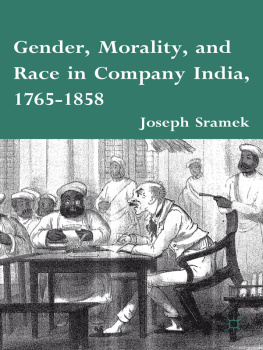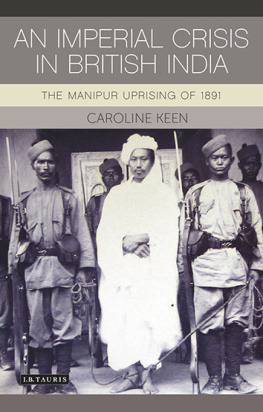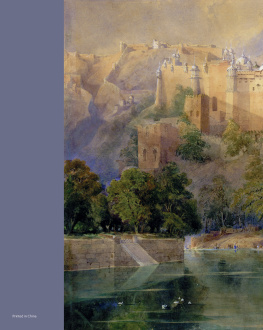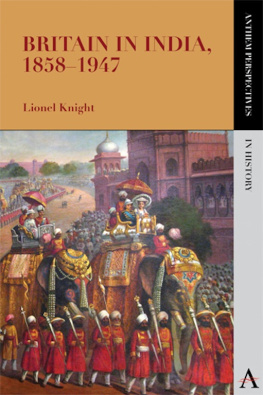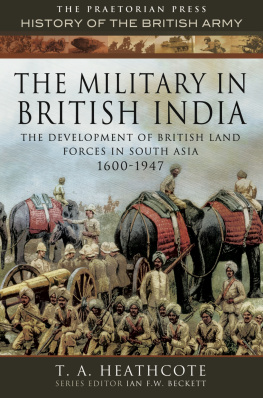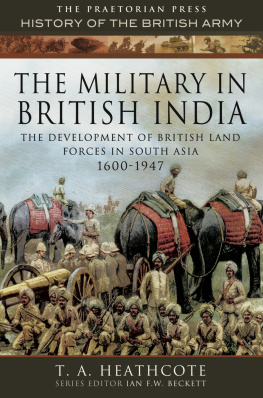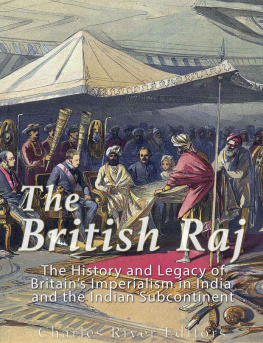Gender, Morality, and Race in Company India, 17651858
Gender, Morality, and Race in Company India, 17651858
Joseph Sramek


GENDER, MORALITY, AND RACE IN COMPANY INDIA, 17651858
Copyright Joseph Sramek, 2011.
All rights reserved.
First published in 2011 by
PALGRAVE MACMILLAN
in the United Statesa division of St. Martins Press LLC,
175 Fifth Avenue, New York, NY 10010.
Where this book is distributed in the UK, Europe and the rest of the world, this is by Palgrave Macmillan, a division of Macmillan Publishers Limited, registered in England, company number 785998, of Houndmills, Basingstoke, Hampshire RG21 6XS.
Palgrave Macmillan is the global academic imprint of the above companies and has companies and representatives throughout the world.
Palgrave and Macmillan are registered trademarks in the United States, the United Kingdom, Europe and other countries.
ISBN: 9780230116931
Library of Congress Cataloging-in-Publication Data
Sramek, Joseph, 1976
Gender, morality, and race in Company India, 1765-1858 / Joseph Sramek.
p.cm.
Includes bibliographical references.
ISBN 978-0-230-11693-1 (hardback : alk. paper)
1. BritishIndiaHistory18th century. 2. BritishIndia History19th century. 3. BritishIndiaPublic opinion History19th century. 4. East India CompanyHistory. 5. Colonial administratorsIndiaHistory. 6. ImperialismSocial aspects IndiaHistory. 7. MasculinitySocial aspectsIndiaHistory. 8. IndiaRace relations. 9. IndiaMoral conditions. 10. IndiaPolitics and government1765-1947. I. Title.
DS465.S73 2011
954.03'1dc22
2011008507
A catalogue record of the book is available from the British Library.
Design by Newgen Imaging Systems (P) Ltd., Chennai, India.
First edition: September 2011
10 9 8 7 6 5 4 3 2 1
Printed in the United States of America.
The basis of this Empire is opinion, an opinion of our temperance and moderation as Governors...
N.W. Kindersley, Madras revenue collector (1828)
[B]y degrees I discovered that the object of their admiration was neither our arts, our arms, nor our science, but our moral qualities...
former Bengal official Sir Charles Edward Trevelyan (1853)
Figures and Map
Figures
Map
Acknowledgments
This book began as a doctoral dissertation written under the expert guidance, first, of Bonnie Anderson and then Timothy Alborn at the City University of New Yorks (CUNYs) Graduate Center. Special thanks also goes to Carol Berkin, Mary Gibson, Thomas Kessner, Robert Seltzer, and Randolph Randy Trumbach for running zero-credit courses for advanced doctoral students to write their dissertations in a structured mannerthis is the Ph.D. Program in History at CUNY Graduate Centers secret to why so many of us finished our doctorates in a timely manner. Randy has also been and remains a generous mentor in the years since graduate school; he has helped me immensely in making the transition from graduate student to assistant professor. He also read several chapters of this book in their early stages. I would be entirely remiss here if I did not also thank a w onderful set of friends from graduate school w ho helped me shape my ideas as well as deal with the Sturm und Drang of first writing my dissertation, and later, this book: Ben Alexander, Dave Aliano, Angelo Angelis, Dave Golland, Jacob Kramer, Steve Levine, Alejandro Quintana, Alex Stavropolous, and Christine Yaris. Bob Ambaras and Steve Essig also deserve thanks for their support and encouragement.
Since the fall of 2007, I have belonged to a wonderful history department at Southern Illinois University Carbondale (SIUC). There is not a day that goes by when I do not silently thank my colleagues for having the faith in hiring me as their British and British imperial historian. More specific thanks go to Robbie Lieberman, w ho has been a fabulous chair in mentoring me and other junior colleagues, as well as Jon Bean, Kay Carr, Holly Hurlburt, Rachel Stocking, Gray Whaley, Jonathan Wiesen, and Natasha Zaretsky. Jonathan Wiesen read the entire manuscript before I sent it out for review a second time for which I am eternally grateful. Kay Carr graciously devotedHer time and expertise into designing the map of northern India that appears in chapter 3. Nate Pedigo was an expert graduate assistant when I was only starting to think about revising my dissertation into a book. Special thanks also go to Christina and Roy Bearden-White, Paula Bilyeu, Rachel Malcolm Ensor, Bill Griffiths, and Deb and Butch Wilson for adopting this New York exile and making him feel at home in the often strange world that is southern Illinois. As a fellow junior colleague, Daron Olson made a great weekly lunch partner during my first two years out at SIUC and he might recognize some of the ideas now in this book. Although he has moved on to greener pastures, he has remained a close friend and a steadfast advocate.
Like other scholars of British colonial India, I have been extremely fortunate in being able to work at the British Library. Our particular reading room has changed names multiple times in the short time I have worked t here f rom t he disti nctly u n-pol it ic ally cor rect Or ienta l and India Office Collections only a few years ago to the Asia, Pacific, and Africa Collections currentlybut Dr. Margaret Makepeace and her research staff have never deviated from the exceptionally high quality of service they provide to researchers from around the world who come to work t here. I would like to thank the British Library now for granting permission to quote from crown copyrighted materials within the India Office Records. I would also like to thank the New York Public Library for granting me access during graduate school to the Wertheim Study and the use of a dedicated shelf as well as the phenomenal inter-library loan services provided by SIUCs Morris Library. I must also thank Chris Chappell at Palgrave and the three anonymous reviewers he commissioned to examine my manuscript at various stages of the process. It would not have become the book it now is without the close and careful readings of my work which each of them gave. Of course, all lingering mistakes remain mine.
Finally, I would like to thank my parents, Dave and Liz, my sister Aimee, her husband Erik, and my four-year old nephew Alex, for their continuing love and encouragement. It is a shame that my grand -mother died while I was still writing my dissertation; she would have been very proud to see her only grandson publish his first book, especially as she funded my very first research trip overseas. This book is dedicated to my parents. From both I have learned that hard work is the coin of the realm, the necessity of thinking for myself and questioning authority when things make no sense but also to have thehumility to admit when I am wrong, and the perseverance never to give up when the going gets rough. Without these crucial traits, I would have given up on this book a long time ago; indeed, I might never have even started it.
Carbondale, Illinois
January 2011
Abbreviations
| AHR | American Historical Review |
| BL/APAC/IOR | British Library, Asia, Pacific, and Africa Collections, India Office Records |
| JBS | Journal of British Studies |
| JICH | Journal of Imperial and Commonwealth History |
| MAS | Modern Asian Studies |
| OED | Oxford English Dictionary |
Next page
